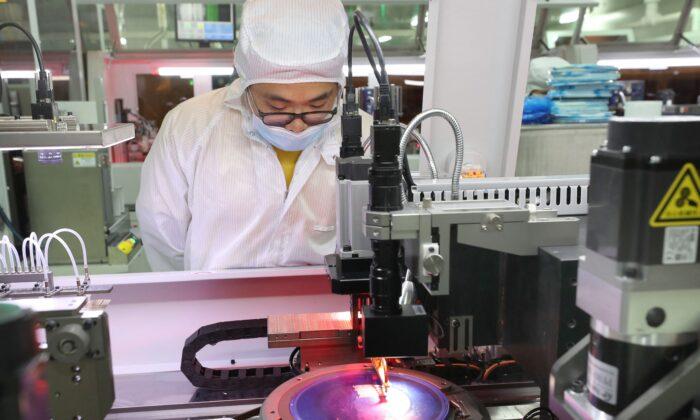China’s tech startup and venture capital boom over the last decade has produced some household names while stoking concerns that it would one day surpass innovation out of Silicon Valley.
But that momentum has waned recently.
Various reasons have dampened international funding into Chinese tech startups, including pandemic restrictions, the communist authority’s crackdown on tech, macroeconomic reasons such as higher interest rates, and growing geopolitical and national security concerns.
Zooming out, let’s review some stats.
Venture funding into China’s tech startups during 2022 totaled almost $70 billion across 6,186 transactions, according to data from PitchBook. That’s the lowest in terms of deal value since 2017, and 49 percent lower in value and 17 percent lower in volume compared to 2021.
Foreign investors’ participation in Chinese deals also declined both in dollar and volume terms.
Fundraising by Chinese venture capital (VC) funds also dropped in 2022. Total fundraising eclipsed $44 billion last year which was less than half of the amount raised during 2021.
Dozens of U.S. private equity and venture capital firms have holdings in China. Fund managers such as Blackstone Group, Carlyle, KKR, Bain Capital, Sequoia, Silver Lake Partners, and General Atlantic all have significant investments in Chinese technology companies.
Among the most active has been New York-based growth equity investment firm General Atlantic. The firm has invested nearly $7 billion in China since 2000 in more than 34 companies, including ByteDance, the owner of social networking app TikTok, which has been the fulcrum of recent national security debate over user data.
The March collapse of Silicon Valley Bank (SVB) brought the financial connectivity between the U.S. VCs and their Chinese startup portfolios to the forefront. The California-based lender served as the vehicle for U.S. VCs to fund their Chinese startups.
Many of the Chinese companies currently listing their stock on U.S. exchanges had early investments from Silicon Valley VCs during their early stages, and the collapse of SVC took away such a vehicle of U.S. to China funding.
In a statement that sounded like hyperbole but may be closer to the truth than many realize, the CEO of startup incubator Y Combinator Garry Tan called SVB’s collapse “an extinction-level event” for startups in a March tweet. And if there’s some truth to that—in that SVB was one of the only major financial institutions that would bank startups that lacked traditional credit—then that would doubly apply to Chinese startups seeking U.S. dollar funding.
Other forces are also putting the squeeze on Chinese startups from a U.S. funding perspective.

The White House is reportedly close to an executive order that would put restrictions on U.S. investors funding Chinese projects on certain technologies, such as semiconductors and other innovations that could later make their way into the Chinese military.
The U.S. Treasury Department has also been coordinating with other governments, such as the European Union, to ensure that allies do not step in and provide financing to China should the U.S. cut off certain of its VC funding.
Making Money in China
While details have not been revealed, the executive order is likely being diluted in impact by certain industry participants and other bureaucrats in Washington that support making money in China.The event’s location was ironically at the SVB offices. “Tom” was allegedly attending the event instead of Jordan Blashek, the president and COO of America’s Frontier Fund (AFF), the U.S. government-affiliated nonprofit investment platform that pursues emerging tech investments.
“If the China-Taiwan situation happens, some of our investments will 10x, like overnight,” the individual said. “So I don’t want to share the name… and so if it’s only produced in China, for example, and there’s a kinetic event in the Pacific, that would 10x overnight, like no question about it. There’s a couple of different things like that.”
We’re speculating what the “kinetic event in the Pacific” means, but it’s likely a euphemism for war. Could the U.S. government be hedging itself—or even advocating—for a war in the Pacific?
AI Military Applications
Over the last several months, we’ve seen the power of artificial intelligence (AI) and machine learning. OpenAI’s ChatGPT has taken the world by storm and kicked off a global arms race by tech firms to create more powerful AI applications.ChatGPT is banned in China, as are other longstanding apps such as Facebook and Twitter. With the power and broad impact of AI, it is one technology that is certainly going to have military applications.
Keith Rabois, a general partner at VC firm Founders Fund, is an industry veteran that opposes most VC funding into China.
Rabois recently tweeted in response to an article by The Information reporting that U.S. VC Sequoia Capital and others are financially backing China’s answer to OpenAI that “This needs to be illegal.”
Rabois, who was part of the famous “PayPal Mafia,” said in a follow-up tweet that “investing in arming the enemy” should be outlawed.
The White House executive order, and more comprehensive and stronger laws prohibiting U.S. tech investments into China, need to arrive as soon as possible.






Friends Read Free